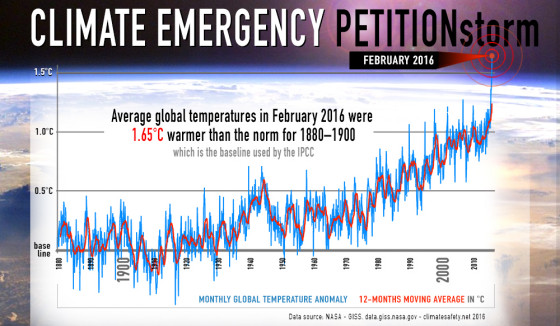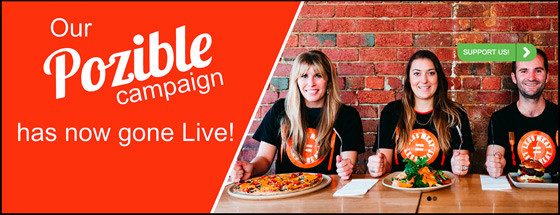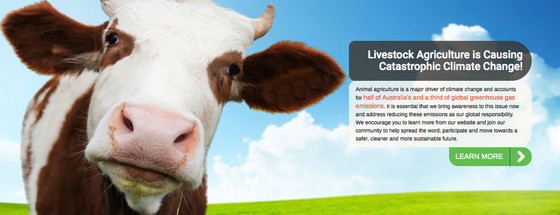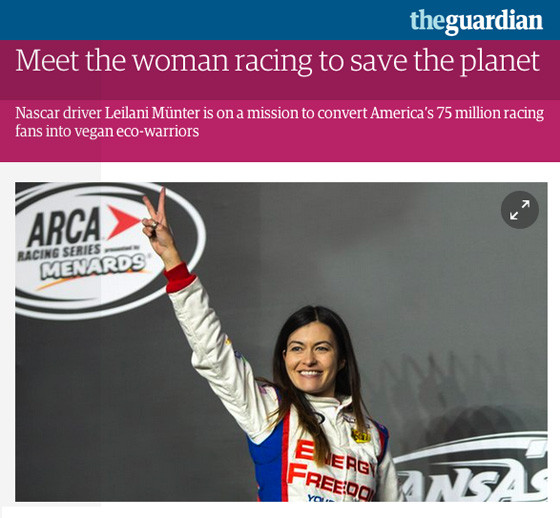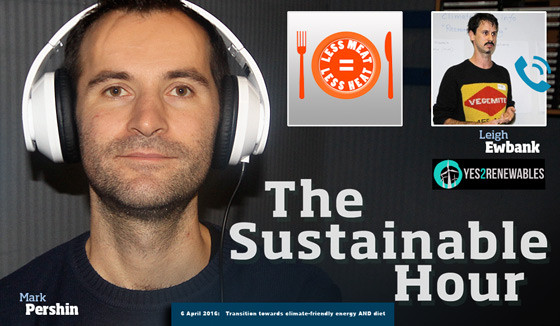
Many people put solar panels on their roof because they are conscious of the climate crisis, but they may not be aware that the benefits to the climate of doing that is completely undermined if that same household eats just one or two steaks a week[1]. Or that it is actually impossible to keep global temperature rise below 2°C degrees unless we transition to climate-friendly diets.
Our guest in the Sustainable Studio on 6 April 2016 is Mark Pershin, CEO and founder of Less Meat Less Heat, an organisation of around 50 volunteers which will be officially launched in July 2016, along with ‘The Climatarian Challenge’ and a crowdfunded Climatarian Challenge App.
Over the phone, Leigh Ewbank from Friends of the Earth tells us about how the Yes2Renewables campaign has been pushing hard for an ambitious Victorian Renewable Energy Target, and that they are now hopefull that we will soon see the Victorian Government launch a new policy in this area which is going to make a real difference for Victorians. “The politicians are listening to the strong community call for renewable energy in Victoria,” Ewbank says.
Listen to The Sustainable Hour no. 116:
» To open or download this programme in mp3-format, right-click here (Mac: CTRL + click)
![]()
» Subscribe to ‘The Sustainable Hour’ podcast — via iTunes or via your own podcast/RSS software
LISTENER SERVICE:
Content of this hour
Links and more information about the things we talk about in The Sustainable Hour today
Climate, energy – and diet
Australians eat a meat-heavy diet. On average every Australian eats 112 kilos of meat per year. That affects the climate. The Australian livestock sector accounts for around 50 per cent of the country’s greenhouse gas emissions.
“You need to tell the full story,” Mark Pershin explains: “To solve climate change, to work towards a safe future, we need to transition to renewable energy, we need to keep fossil fuels in the ground, and we need to transition towards climate-friendly diets.”
Climate emergency
The hottest February and March in recorded history. The northern hemisphere 2°C degrees above normal 84 years too early. A winter-less Arctic. The Great Barrier Reef turned a deathly white. Australia has just had a tragic bushfire season with fires so extreme they created their own weather system in the West and burned ancient world-heritage forests on Tasmania.
This is the background drop to The Sustainable Hour on 94.7 The Pulse on 6 April 2016. After all that has been said an done, in particular in Paris in December 2016, the Australian government still wants to open new coal mines, create growth in the fossil fuel sector while subsidising it with billions of dollars every year.
“Now with the power of the Internet, we can start local and build global very quickly without waiting for the leaders of our respective countries to take action on the things that matter to us and impact our lives,” says Mark Pershin.
Climate, coal and the Great Barrier Reef
ABC’s World Today talked with professor Terry Hughes from James Cook University about what is happening with the Great Barrier Reef. “I’m really angry that the government isn’t listening to us, to the evidence we’ve been providing to them since 1998,” he says. Professor Hughes is leading an extensive survey of the reef.
» You can listen to the interview with Professor Terry Hughes here and read more here.
We talk about the latest findings of our Councillor climate change survey
We play this song by Simon Kerr: ‘Moving a Big Sky’
And we talk about the ‘Climate Emergency Petitionstorm’.
» Sign the Petition for Ambition and show your support for a strong Victorian Renewable Energy Target.
Lead with own choices – three times a day
“The fundamental shifts that we need to avert runaway climate change need to mostly come from demand-side shift, so: our own behaviour. We have to send the signal with our own demand. Because at the end of the day, farmers are ultimately just like me and you – they are trying to make money, they are trying to put food on the table. And if we shift the demand, then the supply-side will follow. The supply-side would not lead. We have to lead with our own choices – three times a day.”
Mark Pershin
The Global Calculator
The Global Calculator allows you to explore the world’s options for tackling climate change and see how they all add up. With the Calculator, you can find out whether everyone can have a good lifestyle while also tackling climate change.
Meat’s carbon footprint
• One kilo of beef or lamb is about 70-75 kilos of carbon dioxide equivalent.
• One kilo of pork is about 14 kilos of carbon dioxide equivalent.
• One kilo of chicken is about 3 kilos of carbon dioxide equivalent.
• Fish is similar to chicken, if not slightly less.
A male person generally eats up to 50 per cent more meat than a female, depending on the demographic
Aussies eat over 260 million meat pies every year.
[1] Installing solar panels on your roof will offset approximately 1.75 to 2.05 tonnes of CO2 per year depending on where you live in Australia. It would only take a household to consume two 300 grammes steaks per week to completely negate this offset.
» Read more: How much carbon does the average solar system save?
Meat – the figures
Serving one kilo of beef has the same carbon footprint as driving 140 kilometres in your car. That is six times more than the carbon footprint of one kilo of pork.
Human activity is causing global warming. Climate change means more extreme weather such as droughts and rising sea levels with more climate refugees as a consequence.
Between 19 to 29 percent of humans’ global greenhouse gas emissions is caused by our food production, when also considering the transport, packaging and marketing of food.
Out of this, the livestock sector accounts for 14.5 percent of human greenhouse gas emissions, and beef production accounts for 41 percent of this sector’s emissions.
In countries like Denmark, diet shift with less intake of meat from cows can reduce greenhouse gas emissions from the food by between 20 and 35 percent.
» Source: ‘The ethical consumer – ethical consumption of climate damaging foods’, a report from the Ethics Council in Denmark
“A climatarian, a reducetarian, and a sustainatarian walk into a bar…”
» Grist – 12 May 2016:
Climatarian, vegavore, reducetarian: Why we have so many words for cutting back on meat

About Less Meat Less Heat
Over a year ago Mark Pershin founded a non-profit called Less Meat Less Heat dedicated to addressing climate change through diet change. No other climate change or general environmental organisation was looking at promoting climate-friendly diets to help address climate change.
Both this issue and organisation are close to Mark’s heart and this drives him to work long hours full-time with other passionate and determined volunteers. They are all working hard to build this organisation to the point at which they can launch our wide-scale public education and engagement strategy, hopefully by the 1 of July 2016.
Crowdfunding campaign on Pozible
“None of us get paid which is fine since we do it purely out of passion. However there are some elements of the campaign that require funding but we currently have none. This is why we launched a crowdfunding campaign on Pozible called The Climatarian Challenge App,” Mark Pershin writes. They are trying to reach $12,000 dollars and are a third of the way there, Mark told us in The Sustainable Hour.
“The Climatarian Challenge will be a way people can try out a climate-friendly climatarian diet over the course of a month, competing with their friends and having a lot of fun along the way. This challenge will require us to develop a smartphone app which is what we are raising money for.
I hereby humbly ask for your help – I call on you as a friend to pledge your support now by clicking on this link: www.pozible.com/project/204652”
We have some exciting rewards for each level of support you can take advantage of but hurry as the best stuff is being snapped up fast. Pozible advised us that the average pledge is $80 but anything you can afford is fine as every pledge large or small gets us closer to our target.
Also please this campaign with your family and friends who also share our concern about the climate so they can pledge as well – every little bit helps. I hope with your help we can reach our target, build the app and create a safer and healthier future for us all.
Thank you,
Mark Pershin
CEO & Founder”
. . . . . . . . . . . . . . . . . . . . . . . . . . . . . . . . . . . . . . . . . . . . . . . . . . . . . . . . . . . . . . . . . . . . . . . . . . . . . . . . . . . . . . . . . . . . . . . . . . . . . . .
Geelong Council Climate Change Questionnaire
Our mayor and councillors – what do they think about climate change?
In the lead-up to World Meteorological Day on 23 March 2016, Geelong’s mayor and 12 councillors were asked four climate change questions, to which they replied in the following order and manner
» Councillor climate change survey
. . . . . . . . . . . . . . . . . . . . . . . . . . . . . . . . . . . . . . . . . . . . . . . . . . . . . . . . . . . . . . . . . . . . . . . . . . . . . . . . . . . . . . . . . . . . . . . . . . . . . . .
Dying reef is a political failure
This page contains numerous recent stories and information about the Reef:
‘Dear environment minister, it’s time for simple logic to dictate your policies’
» www.climatesafety.info/reefbleaching
MISC:
Other news, stories and coming events
Excerpts from our notes – news items which we also had wanted to mention in this Sustainable Hour
. . . . . . . . . . . . . . . . . . . . . . . . . . . . . . . . . . . . . . . . . . . . . . . . . . . . . . . . . . . . . . . . . . . . . . . . . . . . . . . . . . . . . . . . . . . . . . . . . . . . . . .
. . . . . . . . . . . . . . . . . . . . . . . . . . . . . . . . . . . . . . . . . . . . . . . . . . . . . . . . . . . . . . . . . . . . . . . . . . . . . . . . . . . . . . . . . . . . . . . . . . . . . . .
. . . . . . . . . . . . . . . . . . . . . . . . . . . . . . . . . . . . . . . . . . . . . . . . . . . . . . . . . . . . . . . . . . . . . . . . . . . . . . . . . . . . . . . . . . . . . . . . . . . . . . .
“Currently, one third of global food production never finds its way onto our plates. This share will increase drastically, if emerging countries like China and India adopt Western nutrition lifestyles, the analyses shows. Reducing food waste would offer the chance to ensure food security, which is well known. Yet at the same time it could help mitigate dangerous climate change.”
» Take Part – 8 April 2016:
Reducing Food Waste Could Curb Climate Change
“A new study predicts that wasted food could increase greenhouse gas emissions by mid-century.”
» Pik-Potsdam.de – April 2016:
Reducing food waste could help mitigate climate change
“About a tenth of overall global greenhouse-gas emissions from agriculture could be traced back to food waste by mid-century, a new study shows. A team from the Potsdam Institute for Climate Impact Research for the first time provides comprehensive food loss projections for countries around the world while also calculating the associated emissions.”
. . . . . . . . . . . . . . . . . . . . . . . . . . . . . . . . . . . . . . . . . . . . . . . . . . . . . . . . . . . . . . . . . . . . . . . . . . . . . . . . . . . . . . . . . . . . . . . . . . . . . . .
Help planting the M~M Green Corridor
The Green Corridor tree planting project is a component of the M~M Extreme Arts Walk. The planting project is an inclusive project where people with and without disabilities work together to care for our local habitat. All plants have been propagated at Karingal’s community nursery. The propagated plants have been carefully selected in consultation with Parks Victoria to ensure that they are indigenous to their planting site.
The first planting takes place on Wednesday 13 April 2016 at Big Rock, the You Yangs, between 10 am and 12noon.
This planting is a part of the long term vision to revegetate the local habitat with plantings of Indigenous species of grasses, trees and shrubs. The “Green Corridor” strategy is connecting local communities and revegetation organisations together to care for the eleven songline corridors across the 80km walk, so that the region can retain its natural beauty, and it is fitting that Karingal’s first planting is at the You Yangs.
If you would like to participate in the first M~M planting please contact Caroline Moore by either phone or email:
Caroline Moore, Karingal Foundation, phone 03 52221484 carolinem@karingal.org.au
M~M 2016, Geelong’s 80 km Extreme Arts Walk, is on 6-7 May
. . . . . . . . . . . . . . . . . . . . . . . . . . . . . . . . . . . . . . . . . . . . . . . . . . . . . . . . . . . . . . . . . . . . . . . . . . . . . . . . . . . . . . . . . . . . . . . . . . . . . . .
. . . . . . . . . . . . . . . . . . . . . . . . . . . . . . . . . . . . . . . . . . . . . . . . . . . . . . . . . . . . . . . . . . . . . . . . . . . . . . . . . . . . . . . . . . . . . . . . . . . . . . .
![]() Podcasts and posts about climate change
Podcasts and posts about climate change
Streaming live

» The Sustainable Hour is streamed live on the Internet every Wednesday from 11am to 12pm (Melbourne time):
www.947thepulse.com – click on ‘Listen Live’
Podcast archive
Hours and hours of sustainable podcasts
Listen to all of The Sustainable Hour radio shows in full length and in selected excerpts:
» Archive on climatesafety.info
» Archive on itunes.apple.com – iPhone friendly
. . . . . . . . . . . . . . . . . . . . . . . . . . . . . . . . . . . . . . . . . . . . . . . . . . . . . . . . . . . . . . . . . . . . . . . . . . . . . . . . . . . . . . . . . . . . . . . . . . . . . . .
Promote The Sustainable Hour
Print this A4-poster and put it on a wall or a board at your work place, a local café, shop or where ever you think there’d be people who’d find this information interesting.  Go to our Facebook-page and give us a click on the LIKE-button. Let the The Sustainable Hour’s listeners know about your green product. To become a business supporter or sponsor, contact: Liz Carr, Marketing & Business Development, 94.7 The Pulse
Go to our Facebook-page and give us a click on the LIKE-button. Let the The Sustainable Hour’s listeners know about your green product. To become a business supporter or sponsor, contact: Liz Carr, Marketing & Business Development, 94.7 The Pulse
94.7 The Pulse
» 947thepulse.com – Geelong’s Premier Community Radio Station
The Sustainable Hour on social media
» Facebook: Overview of all podcast front covers
» Catch up on Twitter: www.twitter.com/SustainableHour » Twitter tag: @SustainableHour
Share on Twitter
» Share this podcast on www.twitter.com
Transition towards climate-friendly energy AND diet https://t.co/l9rZwZOKdC pic.twitter.com/RGnVvw07Lx
— The Sustainable Hour (@SustainableHour) April 10, 2016
Share on Facebook
» If you’d like to share this page on Facebook, then copy this link:
(First paste the long link in a field on Facebook, wait until the photo has loaded, delete the link again, and then press ‘Post’)
Share on Pinterest
» More Sustainable Hour posts on Pinterest
“Participation – that’s what’s gonna save the human race.”
Pete Seeger, American singer

